Anton Reicha: Complete String Quartets, Volume Two
The Czech-born composer Anton Reicha (1770-1836) was an exact contemporary of Beethoven, and his close friend from their mid-teens. The music of each man demonstrates an awareness of what the other was doing: they showed each other their compositions-in-progress. But although Reicha was closely associated with one of the best-known names in western culture, his own music has been grievously neglected: only his woodwind quintets have achieved any currency. Of his vast cycle of almost forty string quartets just one had been recorded before — an omission this ambitious project intends to put right, thereby revealing one of the most inventive and engaging spirits in classical music.
Kreutzer Quartet, string quartet
Listen To This Recording:
-
String Quartet in C minor, Op. 49, No. 1 (1803–4)
- I Allegro assai
- II Adagio, sempre piano e sostenuto
- III Menuetto (Allegro)
- IV Allegro
- I Allegro moderato
- II Largo
- III Menuetto (Allegro assai)
- IV Allegro vivace
String Quartet in E flat major, Op. 48, No. 3 (1802–3)
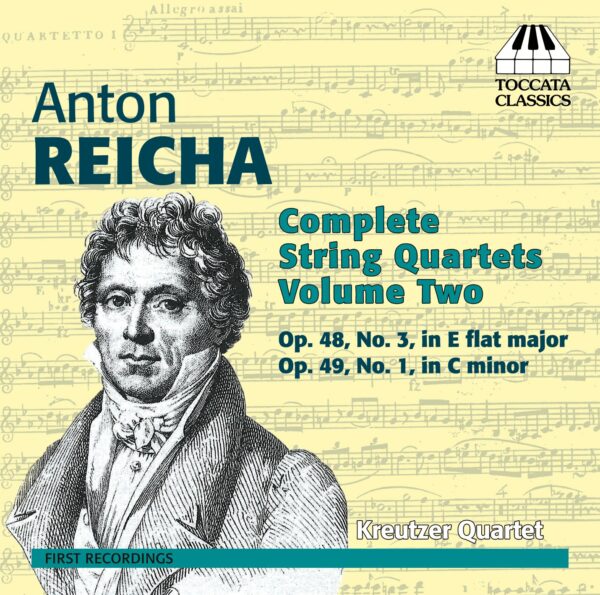
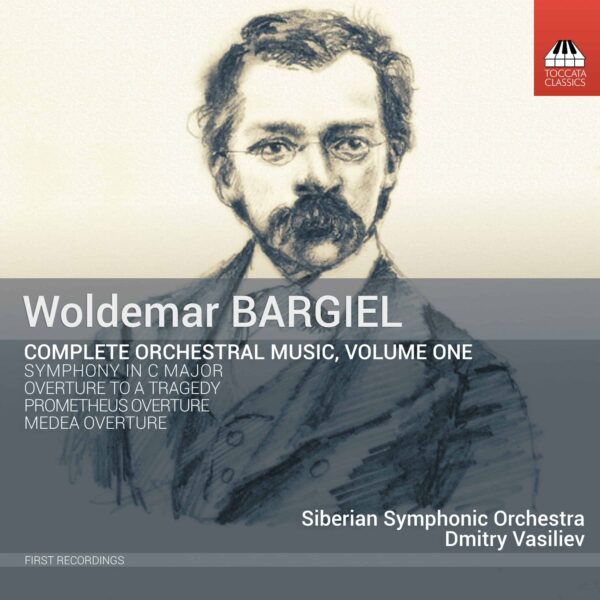
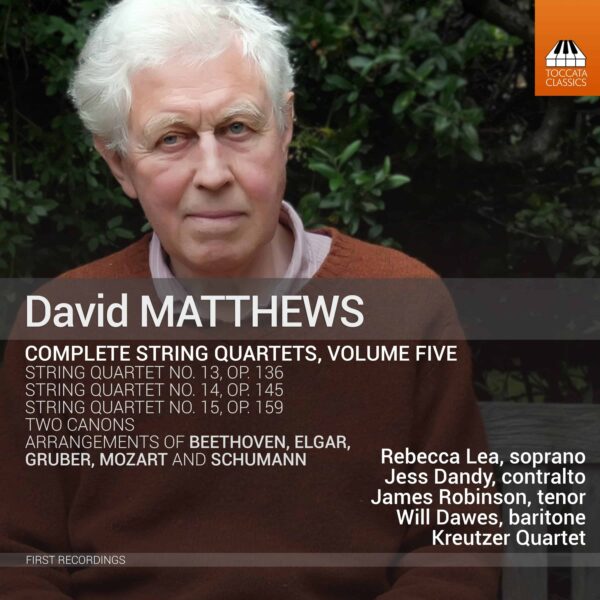
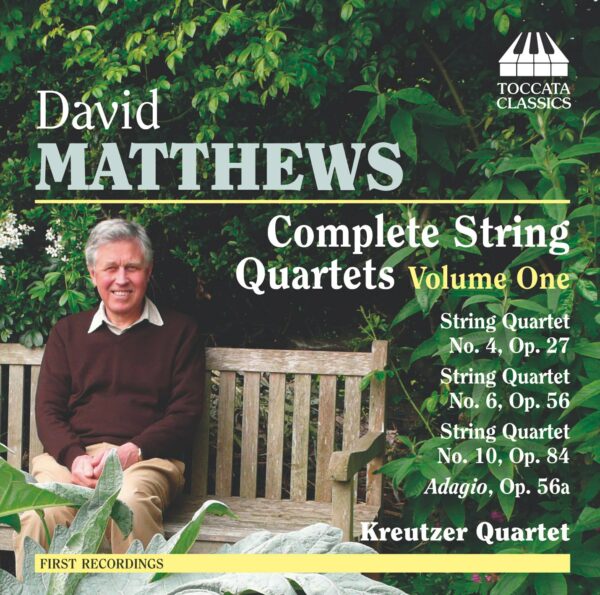
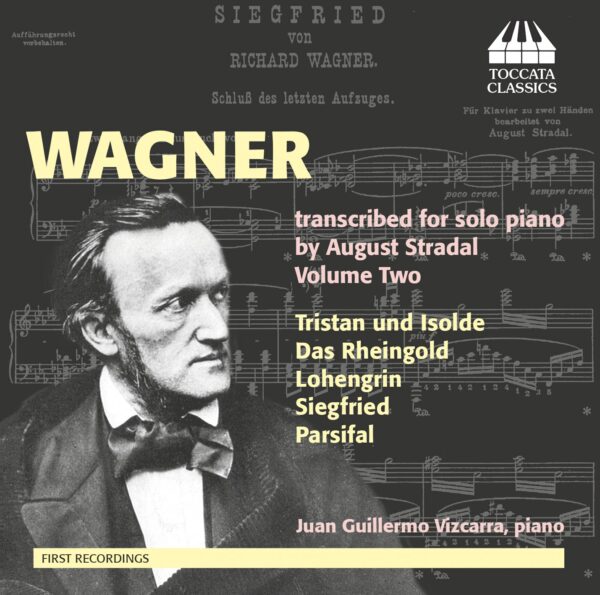
Sinfini Music :
‘…This is – I say it rarely – essential listening. …Recorded here for the first time, they take Beethoven’s classical language and push it through the Romantic barrier – so much so that you might be listening to an early draft of Beethoven’s Razumovsky quartets. In other words, Reicha’s music sounds like the missing link between early and middle period Beethoven… These two quartets are indispensable entry points into Beethoven’s inner world.’
—Norman Lebrecht, Sinfini Music
MusicWeb International :
‘… We hear another eloquently provocative batch of interpretations by the Kreutzer Quartet in good audio. The accompanying notes are peerless in their quality. … The quartets do indeed originate chronologically between Beethoven’s op.18 and his ‘Razumovsky’ quartets, and there are elements of both sound-worlds mirrored in Reicha. Yet he was no slavish borrower of his friend’s ideas, and whilst he was as melodically fertile as Beethoven, he happily ‘out-dissonates’ him in his fearless experimentation. This is self-evident as far as the breathtakingly imaginative C minor quartet is concerned. Reicha himself referred to his ‘great penchant for doing the unusual in composition’, which comes out, in Drummond’s words, ‘as if Reicha in his string quartets overheard late Beethoven and late Schubert, overheard Schumann and Brahms and Dvořák, overheard Bartók and modern jazz.’
—Byzantion, MusicWeb International
American Record Guide :
‘…They are excellent works, quite daring and full of surprises. Reicha was a friend of Beethoven, and they drew inspiration from each other. Like the previous volume, this release is full of great music. The best word to describe these works is perhaps “unpredictable”. You never know what’s coming, and I find myself smiling and sometimes chuckling as I listen.’
—Greg Pagel, American Record Guide
Fanfare Magazine :
‘… The earlier quartet in E♭Major was written between 1802 and 1803 and pays homage not to Beethoven but to Mozart, whose K 428 Quartet was the third of his set of six dedicated to Haydn. There is also the matter of its length. At 17 minutes in this performance it is gargantuan, possibly the longest quartet movement yet written, and it’s a tribute to the Kreutzer Quartet that is projects Reicha’s absorption of and extrapolation on his model so cohesively. … There are certainly opportunities here to explore Reicha’s wilder side; in the Minuet and Trio traces of his sheer oddity are to be noted, and one feels the players straining every sinew to explore those exaggerations, as in the finale one hears them mining the brief, almost cudgeling, insistence of the music amidst the fugue. … If his chamber music is anything to go by, Reicha must have been a florid, even incessant conversationalist. The music is in constant motion, even across long spans, vivid, dramatic, and often theatrical. The later quartet, programmed first, offers more evidence of his inventive, often non-linear writing. There is a cussed quality to much of this quartet, insistent and even raw, that makes it sonically especially appealing. At points it evokes Mozart and Beethoven’s op.18 sets, but Reicha casts his net wider still in the slow movement. Here he turns back to the Baroque, with writing of great yearning and intimacy. … Reicha’s quartets confound expectation. Their nervous, sometimes brittle quality emphasizes the non-conformist element, whilst homage situates them in the direct lineage of (though very different from) Haydn and Mozart and as a second cousin of Beethoven. They are of considerable historical and musical value and have been admirably served here.’
—Jonathan Woolf, Fanfare Magazine
International Record Review :
‘This is another welcome issue in this valuable series, which can only succeed in bringing these neglected works before a wider audience.’
—International Record Review